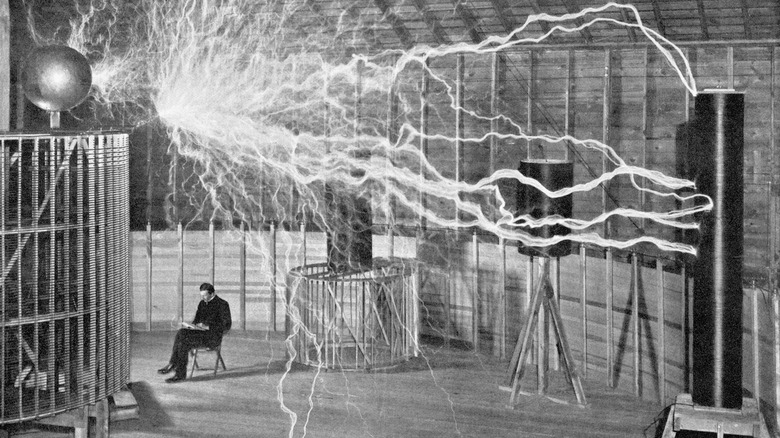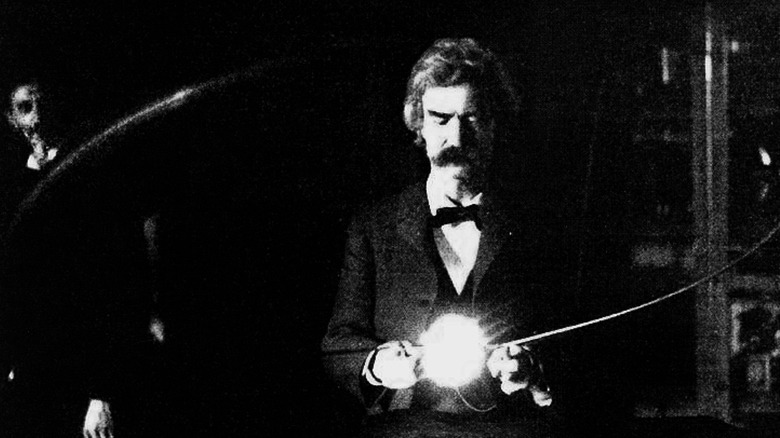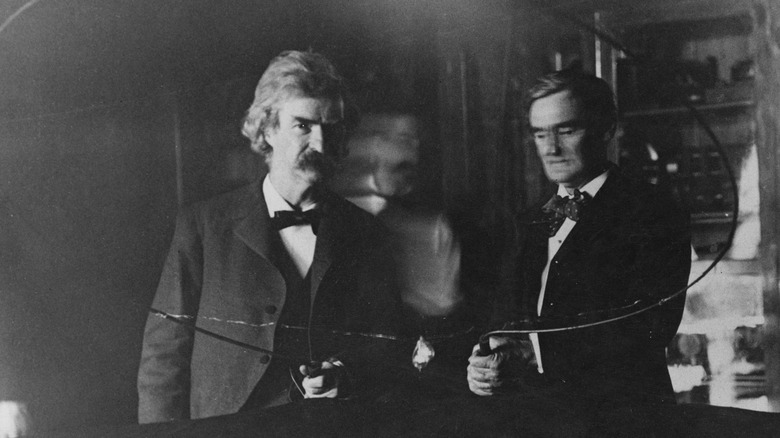Mark Twain's Electric Friendship With Nikola Tesla Explained
Mark Twain has gone down in history as one of the wittiest writers who ever lived. Celebrated as a legend in his own lifetime, Twain's glittering wit, wry observations, and timeless characters have set the template for American humor. His name is still invoked annually at the Kennedy Center in Washington D.C. during the ceremony of the Mark Twain Prize for American Humor, the recipients of which include Richard Pryor, Bill Murray, and Tina Fey. Twain's works continue to be taught in many schools, despite issues concerning the racialized language of novels such as "Huckleberry Finn" (via PBS).
The reputation of the scientist Nikola Tesla has been fan more checkered. As the inventor of the first alternating current (AC) motor, Tesla's work transformed the modern world. However, he died penniless, and his name grew obscure during the 20th century while his rivals such as Thomas Edison continued to be celebrated. He has, however, undergone a renaissance in recent years as a hero of modern technology.
In most people's minds, it might be assumed that Twain would spend his days discussing literature with fellow greats of American letters, while Tesla would count among his closest friends other scientists and engineers. But the fact is that the creator of "Huckleberry Finn" was hugely interested in the world of science. In Twain's day, technology was developing at an incredible speed, thanks in part to the efforts of boundary-pushing experimentalists like Tesla himself. The two became firm friends in the late 1880s and 1890s, with Twain living just up the street from Tesla's laboratory in New York.
A meeting of minds
Nikola Tesla is today considered one of the world's greatest scientific inventors whose countless creations and discoveries were revolutionary. But despite his many achievements, Tesla had a difficult life beginning with his childhood, during which he suffered bouts of severe illness — including cholera, which left him unable to do anything but rest in bed and read books from the local library.
Tesla recalls in his autobiography "My Inventions" that on one occasion during his sickness he was handed a collection of the early works of Mark Twain, which he became so engrossed in that he forgot his illness altogether and soon made what he describes as a "miraculous" recovery. When the two men finally met decades later, Twain was moved to tears to hear how his work had improved the health of the young Tesla, per the same source. Soon, the two would be entertaining themselves in Tesla's lab, with the scientist inviting Twain to experiment with Tesla's inventions himself.
Tesla, Twain, and tummy trouble
Surely two of the greatest minds of 19th century America in the same room together would lead to a famous collaboration of some kind? One might think so, but it turns out that though the two men were obviously fascinated by the new possibilities that electricity offered humankind, there was one immediate issue that Nikola Tesla (center, blurred) decided to help Mark Twain (left) with — his constipation.
As well as attempting to harness electricity for mechanical uses, Tesla also experimented with developing forms of what he called "mechanical therapy" to cure various illnesses and ailments of both himself and his assistants (via Tesla Universe). Tesla claimed that his techniques were successful, with miraculous results. Though Tesla himself didn't go into detail as to how he cured Twain, today the story published by numerous outlets including Big Think goes that Tesla invited Twain to stand on a vibrating platform, which so affected him that he had to run immediately for the bathroom.
Less fancifully, Tesla also gave the wealthy writer advice on which inventions and patents he should invest in, notably trying to convince his literary friend not to invest in certain doomed technologies. In return, Twain invited Tesla to join the Player's Club. By 1909, Twain and Tesla were such good friends that the writer invited the scientist to attend his daughter's wedding, a year before Twain's death at the age of 74.


